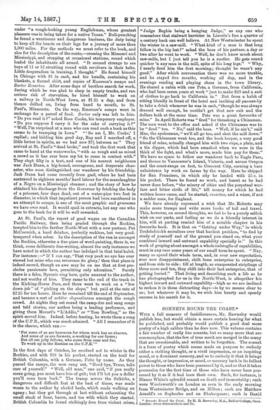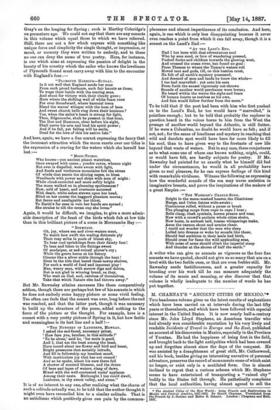SONNETS ROUND THE COAST.*
WITH a full measure of fastidiousness, Mr. Rawneley would publish less, but would obtain a more certain hearing for what he published, and probably would publish a good deal more poetry of a high calibre than he does now. This volume contains a fair number of really fine sonnets, but so many more that are commonplace, that the few of true merit are merged in the many that are unnoticeable, and written to be forgotten. The sonnet is a form of poetry which seems made on purpose to embody either a striking thought, or a vivid impression, or an inspiring mood, or a dominant memory, and so to embody it that it brings the thought, or impression, or mood, or memory back in its fullest power to those who have been possessed by it, and so that it takes possession for the first time of those who have never been pos- sessed by it as if it had been their own. Such, for instance, is Blanco White's splendid sonnet on death and immortality ; such were Wordsworth's on London as seen in the early morning from Westminster Bridge, and on Milton; such are Matthew Arnold's on Sophocles and on Shakespeare; such is David
• &untie Round the Coast. By H. D. Ilawnsley, Baling Colin*, Ones. London Swan Soonenschein and Co.
Gray's on the longing for Spring ; such is Hartley Coleridge's on premature age. We could not say that there are any sonnets in this volume which equal those to which we have referred. Still, there are not a few which express with something like unique force and simplicity the single thought, or impression, or mood, or memory they were written to embody, and to these no one can deny the name of true poetry. Here, for instance, is one which aims at expressing the passion of delight in the beauty of his country which the sailor who knows the loveliness of Plymouth Sound must carry away with him to the encounter with England's foes :— " PLYMOUTH HABBOUR—SUNDAY.
Is it not well that England sends her sous From such proud harbours, such fair haunts as these, To wage their battle with the roaring seas, And shoat for victory with their cloudy guns ; Here where the shifting wall of white foam runs For ever Soundward, where baronial trees Blend the waves' whisper with the ham of bees And sweet church bells ring down their benisons ? Yes, when the sailor's heart is strung for fight, Thou, Edgecumbe, shalt be present in that hour, The Hoe and Hamoaze, dear before his sight, Shalt nerve his arm and lend his spirit power ; And if he fall, yet falling will he smile, Dead for the love of this his native Isle."
And here, again, we have a fine sonnet expressing the fancy that the incessant attraction which the moon exerts over our tides is the expression of a craving for the waters which she herself has lost :—
" Moos-Tumor.
Who knows—yon ancient planet waterless, Once swayed with ocean ; yonder eaves, whence night Not ever is dispelled, were swum with light, And floods and verdurous mountains felt the stress
Of winds that smote the shining capes, to bless
Woodlands with power and ships with men of might While cloud-encircled and more softly bright The moon walked on in gleaming spotlessness ?
Now, cold of heart, and evermore accursed With death, white ashes strewn upon her head, Blind on her course the haggard phantom moves; But fierce and unallayable her thirst, To Earth's far seas in vain her hands are spread ; She strains to tilt the ocean cup she loves."
Again, it would be difficult, we imagine, to give a more admir- able description of the feast of the birds which fish at low tide than in this brilliant picture of a scene in Morecambe Bay :—
Oh, joy, where sea and river-waters meet, To watch how swift the wading dotterels ply Their rosy stilts in pools of bluest sky, To hear cool sprinklings from their dainty feet ! To lean and listen to the flutings sweet Of sandpiper, or sad-voiced plover's cry; While the grave heron at his fishery
Gleams like a silver sickle through the heat ! Blest be the tide that bared these tawny shelves, For such a world of food and innocent play ! Man, weary man, with sorrow digs and delves, But is not glad in winning bread, as they, Who wait on God, and, careless of themselves, Take that which Nature else had thrown away."
But Mr. Rawneley attains successes like these comparatively seldom, though there are perhaps but few of his sonnets in which he does not embody some happy picture or some vivid feeling. Too often one feels that the sonnet was over, long before the end was reached, and that the latter part, though it was necessary to build up the structure of the poem, added nothing to the force of the picture or the thought. For example, here is a sonnet with a very pretty picture of Spring in it, but how feeble and meaningless is its last line and a half !— " THE NUNNERY OF LANHERNE, MAwGAN.
I asked the sad-faced, necessary priest, ' How fare you, brother, in this solitude P' To be alone,' said he, ` for souls is good, And I, that am the least among the least, Have round about me flower and bird and beast, Bright presences that sociably intrude, And fill in fellowship my loneliest mood, With inarticulate joy that has not ceased.'
And as he spoke, about his ears there fell A shower of scented blossom, and the drone Of bees and lapse of waters, clang of claws, Mined with the well-contented rooks' applause Among their nests. Methooght I too could dwell, Lanherne, in thy sweet valley, and alone."
It is of no interest to any one, after realising what the charm of such a solitude actually was, to be told that the author thought it might even have reconciled him to a similar solitude. That is an anticlimax which positively gives one pain by the common-
placeness and almost impertinence of its conclusion. And here, again, ie one which is only less disappointing because it never even reaches a point from which it can fall away, though it is a sonnet on the Land's End :—
" AT TEE LAND'S END.
Had I bat been with that adventurous soul Who by sore need, or love of wandering pressed, Pushed flocks and children towards the glowing west, And Grossed the ocean river, bat found no goal : From Thames to where the Tamar's waters roll Moved tent and gods, till, on this bastion crest, He felt of all earth's mystery possessed,
And deemed of men and lands he knew the whole—
I too had marvelled yet unto his ears From forth the sunset vigorously out-thrown Sounds of another world perchance were borne; He heard within the waves the sighs and fears Of human hearts as restless as his own,
And fain would follow farther from the morn."
To be told that if the poet had been with him who first pushed on to the Land's End, he too would have " marvelled," is pointless enough ; but to be told that probably the explorer in question heard in the voices borne to him from the West the presage of another world beyond the Atlantic, is still flatter. If he were a Columbus, no doubt he would have so felt; and if not, not ; for the sense of loneliness and mystery in reaching that wild and desolate spot would have been far more likely to fill his soul, than to have given way to the foretaste of new life beyond that waste of waters. But in any case, these conjectures as to what some one of whom one knows nothing, might, could, or would have felt, are hardly subjects for poetry. If Mr. Rawnsley had painted for us exactly what he himself did feel under the circumstances, he would in all probability have given us real pleasure, for he can express feelings of this kind with remarkable vividness. Witness the following as expressing how the wonderful sounds of the sea may nurse ambition in imaginative breasts, and prove the inspirations of the makers of a great Empire :—
" THE WARRIOR'S CRADLE-SONG.
Bright in the moon-washed-heaven the Charioteer Hangs, and Orion listens wide-awake '
•
Continuous rolled, without a pause or break The plunging surge from cape to cape I bear ; Bells clang, clash cymbals, horses prance and rear, Now with a crowd's acclaim whole cities shake, Now hosts, in ambush laid, hoarse whisperings make, Anon the cannon shout and armies cheer. I could not wonder that the men who sleep Lulled into dreams or woke by sounds like these, Should feel ambition in their souk: bad birth, Should cross for fame the wild applauding seas, With noise of arms should climb the imperial steep And thunder at the shores of half the earth."
A writer who can give us sonnets as vigorous as the four fine sonnets we have quoted, should not give us so many that are on a level with the two feeble ones, or that are even feebler still. Mr. Rawnsley needs fastidiousness, and a greater capacity for brooding over his work till he can measure adequately the volume of its music and meaning, or else discover that that volume is wholly inadequate to the number of words he has put together.



































 Previous page
Previous page